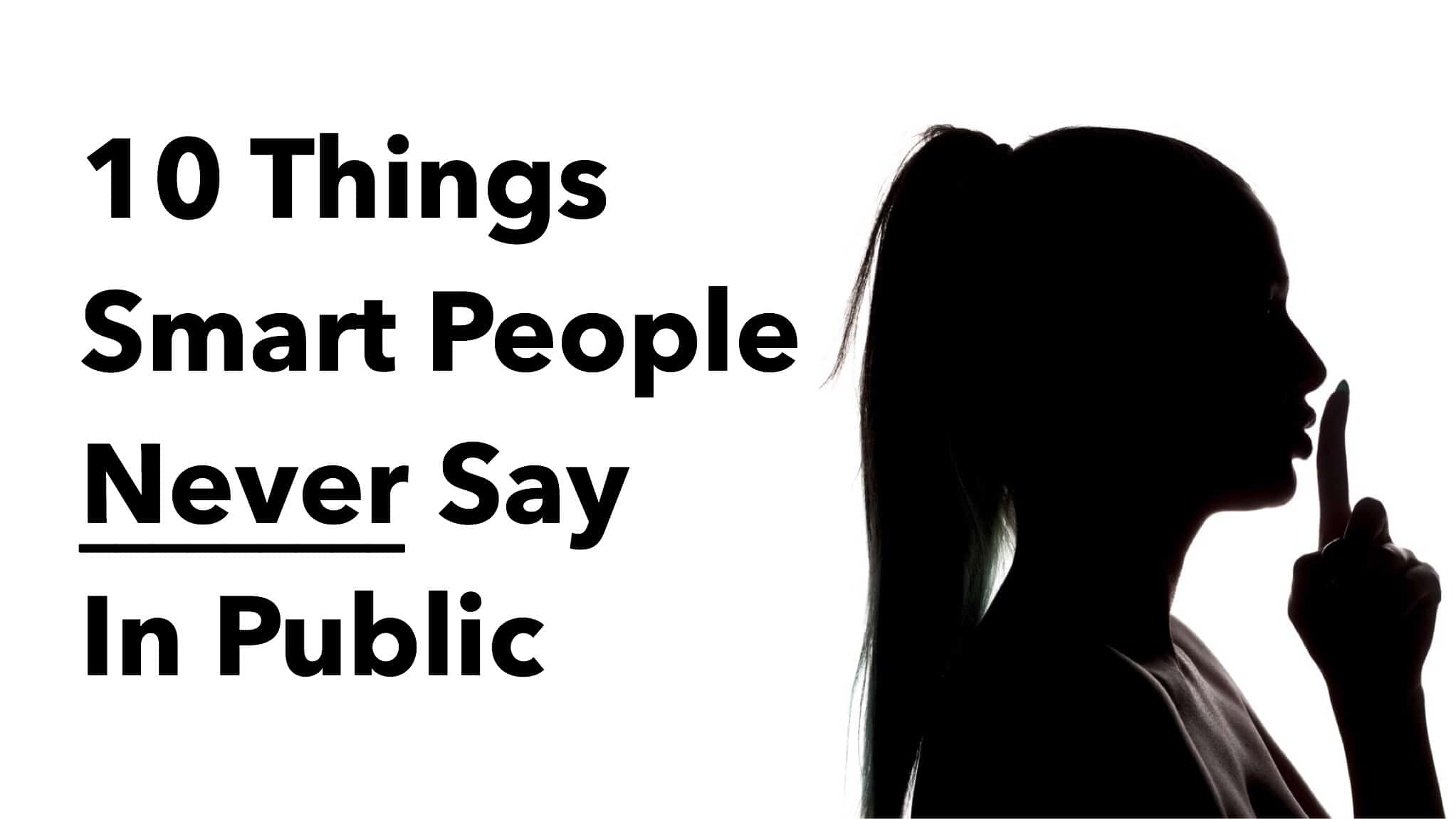We’re not here to discuss the intricacies of intelligence or what makes someone smart, so let’s get that out of the way.
Yes, we know that things like I.Q. are controversial. And yes, we know that intelligence can be defined in many ways. Yes, our current methods of measuring intelligence need to change.
But let’s not kid ourselves. Some people are smarter than others. And, sometimes, we must be able to tell if a person’s smart.
Maybe we’re business owners and need to hire a sharp mind. Perhaps we’re looking for the best and brightest doctor to keep us healthy. Or maybe a brilliant tutor to help our child sharpen their skills.
We want to person we’re hiring to have a good head on their shoulders.
How can we find out who’s smart in a time-efficient manner?
A select group of folks from Quora chimed in – and the we selected just one. Not only does the answer make the most logical sense, but it’s also valid from both a common-sense perspective and an empirical one.
For reference, the original question is: How can I identify the smartest person in the room?
One Timothy Emmanuel Lim wrote the answer that the we chose to use. So, Mr. Lim, if you come across this article, thank you for your incredible insights.
“Different smart people, different cues to look out for.”
To give Mr. Lim his full proper credit and to account for subsequent edits made, the we posted his observations in their entirety. (Please see the edited portions in ‘3. It includes the element of humility.’)
‘Different smart people, different cues to look out for.
The smartest person (in no particular order) is most often;
- The hardest to verbally challenge (they may have opinions, but it’s purely derived from facts and logic).
- The quietest (they’re listening very closely and attentively — still water runs deep).
- The most observant (the little things that count are the big things to see — God is in the details).
- The fastest to question (and the hardest to answer).
- The most reserved, but not shy (because they’re constantly thinking, listening, and processing thoughts, rather than wasting time assuming and unfiltering their comments).
- The least reactive (because they know what to expect and not get surprised).
- The hardest to convince (while rebutting endlessly).
- The most open to question and being proved wrong (truth be above all things — including one’s ego).
- The most (logically) critical.
- The most bored-looking (not bored, just thinking about other things).
- The most unamused (mainly because things may get too predictable).
- The most direct (without being rude).
- The most secretly attentive (watch the eyes, it’s the greatest indicator).
- The most curious (not hyperactive).
- The most calm and controlled (rationality keeps the head calm).
- The most incomprehensible (some intellects are so superior, they’re too intelligent to be understood, given the right circumstances — thirties communication range).
- The most unorthodox (lateral thinking often proves intellectual superiority).
- The most receptive (open-minded).
- The most verbally intense.
- The one who looks the most dumb (circumstantial — never judge a book by its cover).
- The least impressed (they’re impressed by things not many people are impressed by, vice-versa).
- The least outwardly impressive (again, still water runs deep — they usually don’t care about other’s impressions of them).
Of course, these are some characteristics. The smartest person in the room doesn’t need to display all 22 because it can be subjective to character, personality, views, and upbringing.
The list is non-exhaustive. There are also exceptions here and there.
The smartest is not to be confused with the most knowledgeable. The two characteristics often go hand-in-hand but are independent of each other.
And smart people don’t often think of themselves as smart.
Why Lim is Right
There is much to unpack here, so let’s get to it.Lim’s response makes sense for two reasons: (1) the humility with which he writes, and (2) the (probable) truth behind its assertions.
I wanted to check Mr. Lim’s credentials by reading some of his Quora posts. He does indeed craft his answers with what seems to be piercing logic. He writes well and is extremely thorough in both his original postings and in his replies. Moreover, he cites references and considers details – two marks of an excellent mind. He’s most certainly of above-average intelligence, a.k.a., smart.
Most importantly, he is humble and open-minded. As we will find out, these are also common characteristics of smart people.
I then got into the meat of Lim’s answer – and am in total agreement on almost every point. Here’s why:
-
It mirrors a subjective experience.
Most knowledgeable people fit what Lin says to a T. They’re bright without showing it; quiet, receptive, and respectful; reserved and non-reactive; curious and openminded; humble and unassuming.
Most people would agree their perception of smart people is nearly dead-on with what Lim describes. While this isn’t empirical evidence, it’s quite strong and commonsensical.
-
The author describes introversion, which is related to high I.Q.
If you read through Mr. Lim’s list, you’ll notice that pretty much every line applies to the introvert.
Why is this important?
Because there exists a direct link between introversion and high intelligence. In a study undertaken by researchers at the University of North Georgia (USA), researchers state in the introduction “It’s (noted) that introverts may exhibit higher I.Q. scores due to their calculated and analytical predisposition because they are more prone to think through things rather than being impulsive.”
Included in the analysis were 59 female undergraduate students; 41 tested as extroverts and 18 as introverts. The introverted group “had significantly better I.Q. scores” than their extroverted counterparts.
Multiple other studies have reached a similar conclusion: introverts are (generally) smarter.
-
It includes the element of humility, which is characteristic of smart people.
Most smart people exhibit an air of humility, and the ones that don’t aren’t the smart people you want to associate with. Mr. Lim includes two excellent quotes that typify a smart person’s attitude towards their own and others’ intelligence:
“I know I’m intelligent because I know that I know nothing.” — Socrates
And an even better quote to corroborate;
“The more I learn, the more I realize how much I don’t know.” — Albert Einstein
Of Socrates, Lim adds:
“A dissection on the quote of Socrates; Socrates states that the more you know — the more aware of what you don’t know, realizing that there is only so much your mind is capable of understanding, henceforth paradoxically stating that intelligent people understand their limitations and therefore humbly acknowledges that they’re not knowledgeable (enough)…”
Also notice that Lim’s response includes open-mindedness, curiosity, reservation, and quietness. Each trait is a hallmark. Such traits often indicate humility, as well.
We could also strengthen the argument for Lin’s insights by pairing #3 with #2. We most often link humility with introverted personalities, which, as we’ve shown, links to higher intelligence.
-
It makes sense (look at the smart people in your life, including yourself!)
Lin’s answer makes almost total sense. I say almost because it is missing what I believe to be a crucial element: a good heart. Heart intelligence is a real thing, and it is important.
So, Mr. Lim, may I suggest that you add the 23rd item to your list? Let’s keep it simple: “They have a good heart.”
Final Thoughts on Discerning a Smart Person
After you find the “smartest person in the room,” ensure they have the heart to go with it.
















 Community
Community

